#Tristes Tropiques
Explore tagged Tumblr posts
Text
sing with me🎶🎵🎶

#my art#art#fanart#illustration#reverse 1999#reverse 1999 fanart#anjo nala#tooth fairy#bound with anjo nala#tristes tropiques
218 notes
·
View notes
Text

Anjo Nala 🦎
93 notes
·
View notes
Text
Tristes tropiques: The worst chapter in Reverse 1999
Alright, so I’ve wanted to talk about ch8 of the main story since I’ve finished it because it’s, imo, the worst drop in writing quality we’ve seen in the game so far. It has a lot of inconsistencies, things that aren’t explained or happen off-screen, and the emotional segments are rushed/not impactful enough, and about characters we’ve barely seen (excluding Anjo Nala, who is the best part of the chapter imo). Now, as you can see, this will be quite a negative take, so if you liked this chapter, please don’t let me ruin your fun lol. Also, it’ll have spoilers, so be warned.
Part 1: The representation.
Alright, had to get this out of the way first because it’s what everyone is talking about. The representation.
Is the representation bad? Yes. Really, really bad if we compare it with literally all other stories in the game. To put things in perspective, imagine if in the Notes of Shuori event nothing changed but they clamed this was Japan instead of China, yet characters still spoke in Chinese, had Chinese names, and many of the references were Chinese. That would have been outrageous, wouldn’t it? Well, that’s basically what happened here but with Brazil and other Latin American countries.
What they tried to do, basically, was dump all of Latin America (you, know a region that’s bigger and more diverse than Europe) into one singular “culture” and put this in fictional Sao Paulo. Why do I say that? Because many of the words they use for different things are in Spanish, and many characters speak in Spanish, have Spanish-sounding names, and reference things from other countries in Latin America. Also, one of the npcs, whose name I don’t care to remember, is literally a walking Mexican stereotype. To me what this says is that they didn’t do any research at all about Brazil (for those of you who don’t know, they speak Portuguese and are also far enough away from Mexico that these two cultures aren’t really comparable); enough that they couldn’t get even the language right, or even the geography or the Sao Paulo landscape, judging by what I’ve seen being said by Brazilian players.
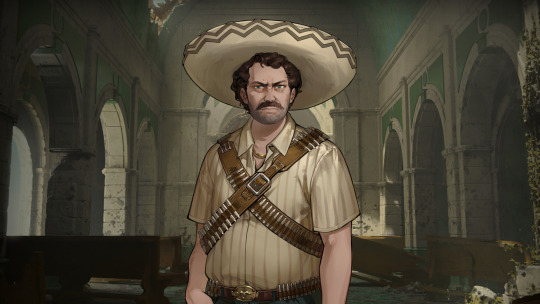
Remember when they accurately portrayed the Secession building in Vienna? Or Jantar Mantar in Mor Pank? Or how they usually have characters speak small phrases in their native language, which is appropriate to the region and their character? Well, Bluepoch doesn’t, apparently.
Then there’s the whole “life here is hell, this is hopeless and everything here sucks” aspect of their portrayal of Sao Paulo (and their infamous tweet). This feels especially disrespectful when the story so far has always had quite a good amount of nuance. Vienna for example, having the contrast of being the “city of freedom”, yet having such a strict oppression of arcanists. Or San Francisco, having such a huge poverty and gang problem, yet still portraying the people living in these conditions as actual humans with hopes and dreams that they sometimes were able to accomplish.

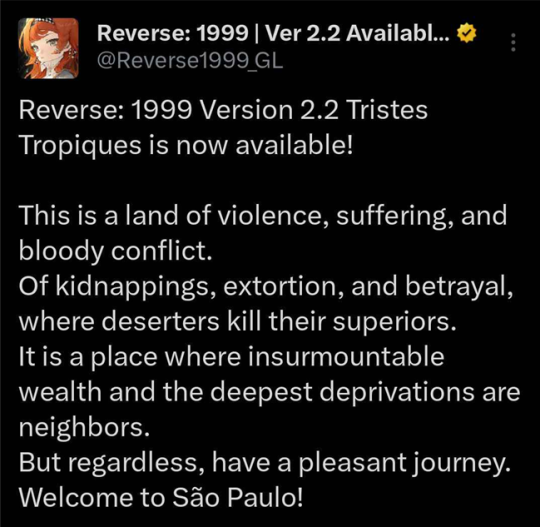
And finally, to wrap up this representation thing… it feels disrespectful that the only Brazilian character we get is Mr. Duncan. Mainly because it seems he’s not really Mr. Duncan, but actually Mr. Karson. You know, an English man. I think they should’ve made Lopera Brazilian because so far having her be from Colombia adds nothing to the story, and if she was from Sao Paulo it’d make a lot more sense for her to be Vertin’s guide/translator in the city.
Okay, so that’s what we get from the representation in this chapter, which is pretty bad (haven’t read Anjo’s character story, which I’ve heard is better in this aspect, but that’s not actually part of ch8, so I excluded it). However, honestly I wouldn’t mind that much if the story had at least been good. So… let’s talk about that next, shall we?
Part 2: The story.
The good.
Okay, first let’s get the good things out of the way, because I don’t want to sit here and pretend that everything about this chapter was bad; that would be unfair and disingenuous.
I liked Lopera and Molly. They were interesting characters and have a lot of potential for the future of the story, which I really hope they deliver in future chapters.
I liked White Rum; she’s a funny character, and the concept of an Awakened pirate ship that has the skeletal hand of her former captain (Anne Bonnie, my favorite pirate of all time) is quite an interesting and unique idea, and I wish we got more characters like this. Also, I need to see her interact with Regulus lol.
I absolutely adored Anjo Nala. She’s the highlight of the story for me; an interesting, complex, and adorable character with a lot of potential for stories to tell, both about her past and her future. I really became attached to her over the course of this story, and I think they did a good job making you care for her… in this specific chapter. Don’t look back at versions 2.0 and 2.1 if you don’t want to get your fun ruined, because consistency is something they didn’t care about at all while writing this patch. And that brings us to…
The bad.
Buckle up my friends because what’s bad about this chapter is really, really, REALLY bad. Consistency is something they don’t believe in anymore, retcons are on the market, and setting up characters/settings/relationships is a thing of the past.
Does it sound like I’m being too harsh? Maybe, but it’s deserved, so idc.
Let’s start from the least bad, shall we? Anjo Nala’s hunger. In 2.0 and 2.1, as well as the first of Anjo’s monologues (the things you unlock after getting traces of a specific character), it’s implied that she can’t eat human food. Not that she doesn’t find it satisfactory, or that she doesn’t like it. It’s heavily implied she literally can’t eat it.
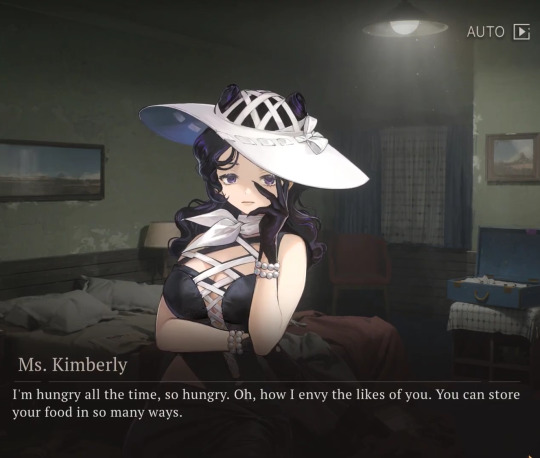


But then she steals some bread and Vertin gives her chocolate, and she eats both, so… what’s up with that? Also, they never really explain what her hunger is for. Was it really just normal human food? Or something else? In her trailer (which btw I wouldn’t consider it part of the main story because it’s a freaking trailer, but whatever) she “feeds on someone’s love” by using her tail. Okay, but then that person turns into a “walking corpse”. Does she have to do that every time she’s hungry? What happens if she doesn’t? Is human food substitute enough? The game never answers these questions, which is a mistake because this whole thing is a central part of Anjo’s character, as well as her turning from her bloodthirsty self to the Anjo we meet in this chapter.

And this brings us to my second issue… the inconsistency of Anjo’s character with the two events we had before this patch. Don’t get me wrong; I’m not saying anything she ever did was her fault since she was simply a slave following orders, and one thing that is consistent about her character is that she doesn’t like when people do give her orders. However, what really annoys me is how in 2.0 she was very bloodthirsty. Sure, she didn’t know J and his gang, and she had done these types of jobs before, but imo it would’ve been more consistent with the other patches if she was indifferent about killing them, rather than excited. 2.1 was slightly more consistent with ch8 when it comes to Anjo’s character, but it’s kind of implied it was all an act, and her “real” personality was that of 2.0.
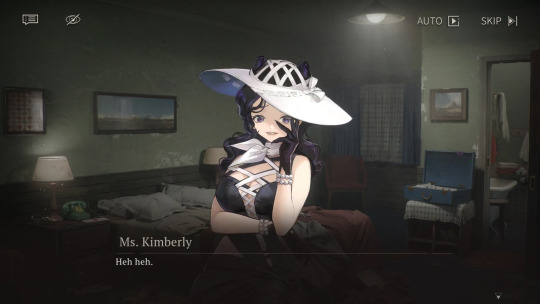
Now, I’ve seen some ppl explain this as “well, in a wilderness interaction she says she acts however her master prefers her to”. Okay, but why put such important information in a freaking wilderness interaction and not in the main story??? You can’t even see those unless you have the character, and seeing as Anjo is limited, not everyone will have her. This is a fact.
Another problem I have with Anjo (this is the last, I promise) is that we’re not introduced to her again in ch8, which surely is a decision. Why? Because 2.0 and 2.1 aren’t part of the main story; they’re side events, which are time-limited and, at the moment, not available in-game. This is a problem because anyone who didn’t play those events for one reason or another will be very confused by Anjo Nala and how Vertin reacts to her. It would’ve been better if we were introduced to her from the pov of Lopera, for example, when she raided the Manus base and captured her. And then we could have Vertin run into her on the ship and explain to Sotheby (with a little more detail than what we got) that she actually met her before.

I’m just saying, this isn’t the first time we got a character in a main chapter that had been previously introduced only in an event (Marta/Bessmert), but in that case, if you missed the event, you could still fully enjoy the main chapter, because you wouldn’t even know that you were missing information. That’s not the case here.
And speaking of Urd… okay, let’s talk about how little sense it makes for the Foundation to want to find her in this chapter. In ch5 Vertin and her team found a suspicious radio that talked about a travel note about Aperion written by someone named “Urd”. In this case it makes sense for them to want to investigate, since the base Ms. Radio was in had things that belonged to the Manus, and they found some Manus followers there as well. Even after ch5 and everything that happened, it still makes sense for Vertin to want to keep looking for Urd because now she has the suspicion, based on what 6 said, that Urd is her mother.
However, although it makes sense for Vertin to want to find Urd, it doesn’t make sense for the freaking Foundation to want to find some random UTTU editor. Because that’s really all Urd is, isn’t she? She’s not the head of UTTU (that’d be Pandora), and the fact that she can traverse the storm, which is the only reason we’re given in ch8, is shared among all UTTU editors, as we learn from Barbara.
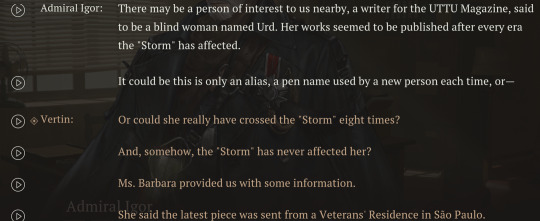

But even if we assume the Foundation wants to know how UTTU keeps its editors safe… first of all, why? We already have the equilibrium umbrellas, don’t we? We spent a whole chapter seeing their creation, and even saw ppl die for this cause. Why would they need yet another method for surviving the storm? If they instead suspected UTTU to be involved with the Manus somehow, and that’s how they’re traversing the storm, then at least give us that!
Furthermore, the Foundation already knew where she was! They were the ones who gave her the white marble chair with a button! If they just wanted to speak with her, surely a simply call would’ve sufficed? Why send Vertin?
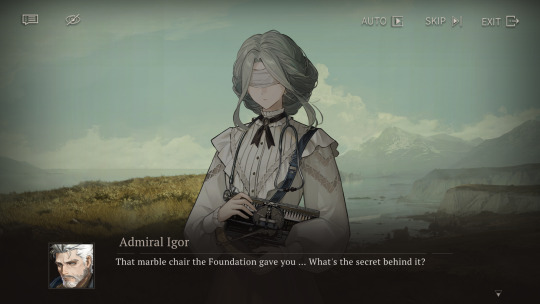
And that’s another thing! Constantine knows Vertin’s mom, and I'm sure she’s not the only one in the Foundation who does, yet the Foundation tried to cover it up and tell Vertin that she doesn’t have a mother. Clearly they have some motivation for keeping it hidden, right? Then… why send Vertin specifically to search for Urd? Why not send some other random investigator, preferentially one with experience finding ppl? Why Vertin???



If Vertin had gone out of her own will, like in ch5, I’d have no problem with this, but no; the Foundation sent her this time. And I just can’t bring myself to understand why.
Maybe if Urd isn’t Vertin’s mom, that would explain this, but for now this makes no sense at all.
Next I want to talk about Lopera and Molly’s relationship. I said before that I truly liked their characters and their relationship, which is true, but… I wish it had been better stablished. Why? Because we had only had one, one single scene, of them together and the suddenly there was a grand betrayal and we’re supposed to feel bad for Lopera? Lmao.
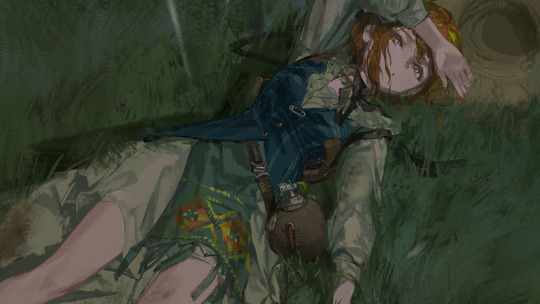
If I felt slightly bad for Lopera it was because of the voice acting, the music and the art. I can assure you, not one single ounce of those feelings came from the actual story being told. It’s even worse when it comes to Igor because he barely exchanged words with Lopera, and all we know from their relationship comes from Lopera telling us “he’s better than my biological father”. And let’s not talk about Ptoleme. He literally only appeared to be a jerk for like five minutes and neither Molly nor Lopera seem to care much about him. How are we supposed to care about that entire family? They really don’t feel like a family at all (except for Lopera and Molly, but even then, it’s the bare minimum this chapter could do with this concept).
It would’ve been so much better if we had this whole chapter to stablish Lopera’s relationship with her adoptive family, with Zeno, the veterans and the Sao Paulo community, and then in the next chapter we could have the big betrayal be more impactful. But here? We barely spent any time with these characters!
And then we have the actual betrayal scene, which is… nonsensical. At best.
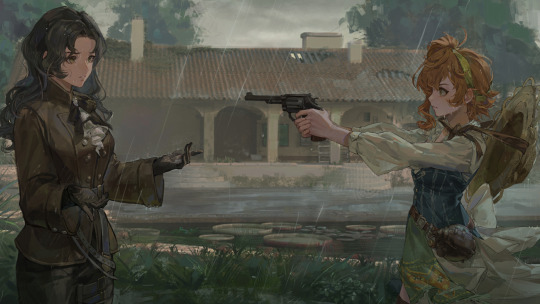
What happened in it? Molly arrived at the Colonel’s manor with her squad of Zeno soldiers and attacked the few Apostles Brotherhood ppl that remained, then says she’s glad that Lopera was able to rescue Dr. Dores and that they should all go back to the base. None of this is suspicious, imo, because Vertin had already told Lopera that she was going to call Zeno for reinforcements, specifically to assist with the rescue of Dr. Dores. It’s true that Molly hesitates a little when Lopera asks “what about the timekeeper?”, and that she dismisses Lopera’s concerns about evacuating Sao Paulo, but imo this shouldn’t be enough for Lopera to be so suspicious of her freaking sister. Also, why ask “who’s waiting for you in Tierra del Fuego”? Why would Lopera every think this was anything other than a mission from Zeno???

Sure, they didn’t tell her about it, but also she’s been gone from the base for a couple of days and she knows there’s been traitors and rebels. A lot could’ve changed in that time. Even if she didn’t want to leave because she got attached to Sao Paulo, I think it’s weird that she immediately was so confrontational about it, especially with her sister, who famously just follows their father’s orders without questions.
This could’ve worked if Lopera was already suspicious of her family beforehand, or maybe even of Zeno’s higher ups, or if Molly and her squad had just waltzed in without attacking the Manus or being attacked by them. But that’s not what happened. Also, if she really was suspicious, why not go back to the base and question Igor about this whole thing like Molly suggested? I don’t see why she immediately would think base=bad when her whole family and the army she’s part of is currently at the base.

Like, I get she already had trauma because of her biological father being a jerk, but that situation doesn’t seem to have anything to do with this one imo. All in all, what I’m saying is that the bad writing of this scene lessens the emotional impact.
And it’s not the only emotional scene that’s affected by the blatant bad writing in this chapter. No, that “honor” goes to the scene the trailer for this patch opens with; Anjo being ordered to kill Vertin by Ptoleme.
Okay, so as a refresher, Igor requests that his son, Ptoleme, is sent to the base because “he can only trust in his children because they always obey him”. Okay, so then what does Ptoleme do when ordered to bring back Kimberly, preferentially without a fuss? Of course, cause the biggest scene imaginable, which leads to Kimberly being freed.
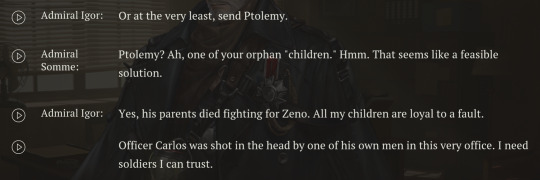
Now, I wouldn’t be so harsh on him if his actions were reasonable but due to circumstances led to an unfavorable outcome for him, but that’s not what happened. Okay, he ordered Anjo to kill Vertin. Whatever, he’s a sadistic asshole, but this at least kinda makes sense. What makes no sense whatsoever is that he not only gave Vertin a gun because “he won’t shoot an unarmed civilian” (why does he care? Also ultimately he orders Anjo to kill her, so he wouldn’t have shot an unarmed civilian anyways), but also that he kept trying to make Vertin shoot Anjo.
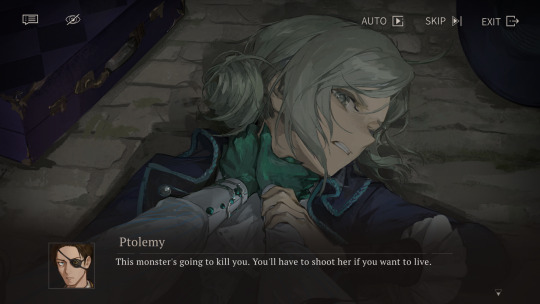
Why? Just why? There was no reason for him to want Vertin to kill Anjo. None at all. And if what he wanted was to convince Anjo to kill Vertin… he can’t play both the “I’ll free you if you kill her” and the “Vertin, kill her, she’s a monster” cards at the same time. It makes him look like a pathetic moron with no sense of reality whatsoever, and in retrospective makes Igor look like a bigger idiot who doesn’t know his children at all. I think the reason they did this is because they wanted to replicate the infamous orange scene from ch2, but without all the logic, lore and emotional impact behind it, just hoping players would feel emotions by association.
And finally, we come to my biggest complain about this chapter: the retcon about how the storm works. Because yes, it is a retcon. Why do I say that? Mainly based on ch6.
In ch6 we learn that Heinrich, in 1912, left Vienna to study at Berlin. There, he met the Manus and joined them, surviving that storm, and subsequent ones, until time returned to 1913 and he went back to Vienna, reuniting with his old friends and telling them about the storm.
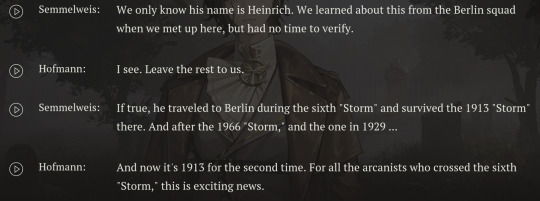
Now, how is this relevant? Well, from Heinrich’s story we learned two things; 1) you can indeed see again someone who was once reversed by the storm, but only if time ever goes back to that era, and 2) The fact that his friends recognized him and he recognized his friends, and his friends’ existence was consistent even though the storm had once reversed them. You see where I’m going with this, don’t you?
At the end of ch8, Vertin says “the storm doesn’t kill ppl, at least not physically”. Okay Vertin, did you have a lobotomy between chapters? The storm has never killed ppl; it’s just the end of an era, remember? It reverses time! It’s in the freaking name! The scariest part about the storm isn’t the storm itself, but the storm syndrome, which is when most casualties seem to happen. Sure, the storm sucked for Vertin because she kept traversing eras and losing the friends she made in them, but those friends remained anchored in their own time (perhaps with the exception of ppl who had already crossed the storm at least once, like The Ring and Isabella, but I digress).
My point is, that I really don’t like where this retcon is headed, but I do hope they somehow fix it in the future, either by making it clear that not everyone who gets reversed is reincarnated and there’s very strict conditions that should be met (like having knowledge about the storm, for example), or this hypothesis is wrong and the storm isn’t actually making ppl reincarnate.
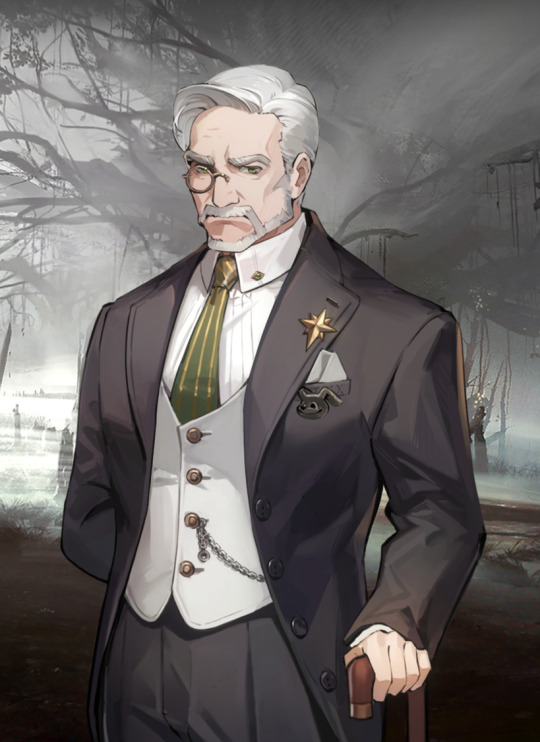

One reason I especially don’t like this new reincarnation thing is that… Mr. Duncan isn’t Mr. Karson. Let’s not lie to ourselves. He looks nothing like Mr. Karson (and I wish the game would stop gaslighting me), doesn’t act like Mr. Karson, doesn’t speak like Mr. Karson, and doesn’t even have the same nationality as him! The only things that are similar about them is that they’re both old war veterans who once had a dog and now have a soft spot for young ladies. And if this is the approach they’ll use to bring back characters in the future… thanks, but I’d rather they stayed reversed.
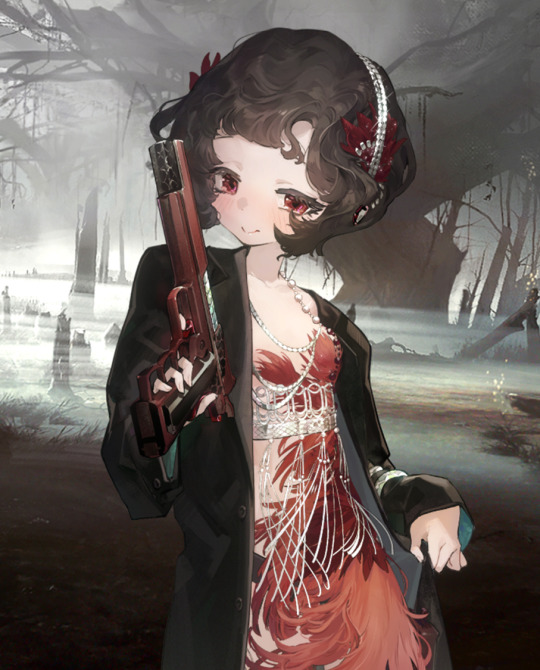
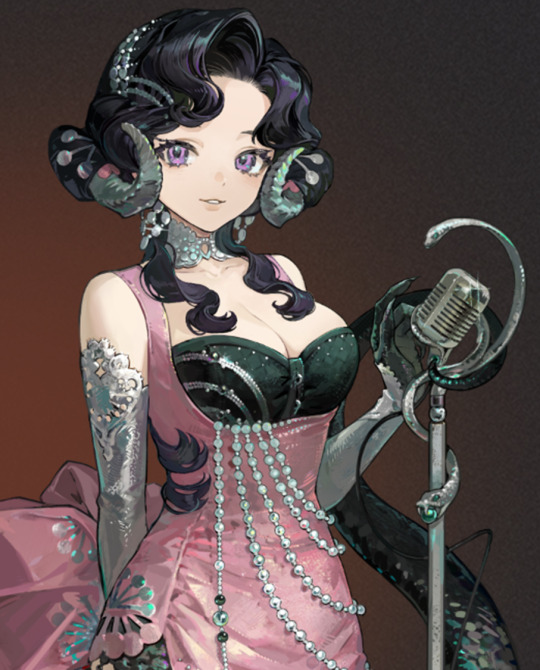
Think about it! Will they next say that Anjo is Schneider? They look similar enough (more similar than Duncan and Karson, that’s for sure!), both were antagonists that joined the manus for reasons beyond their control, both had a fight with Vertin in which they almost got killed, and both have a snake bracelet on their left arm. Surely that’s enough to say they’re one and the same, according to this logic!
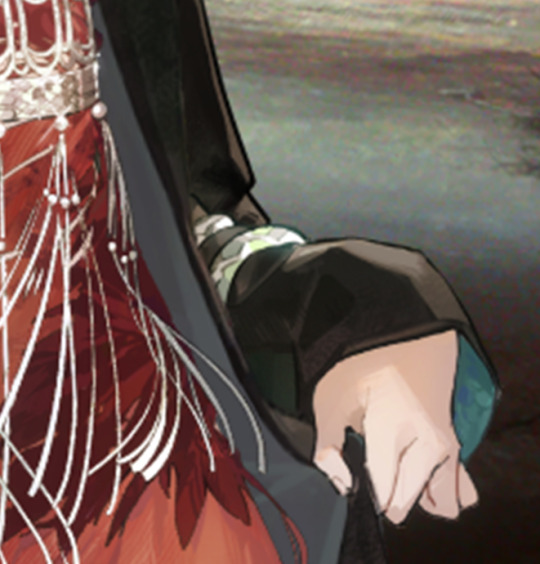
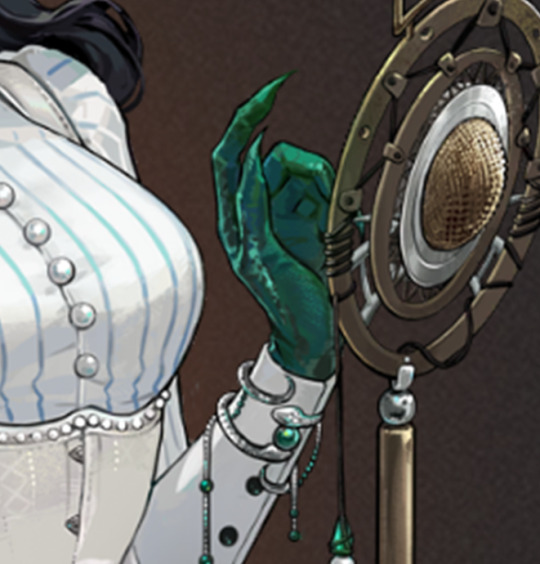
My point is that using such simple similarities, they can literally invent any new character they want and then say “this is actually this other character, who was once reversed by the storm”, regardless of if they’re actually similar at all, and I don’t think that people who wanted them to bring back Schneider or Marian, or Mr. Karson, or 888, or literally anyone, wanted them to be brought back like this.
But that’s enough of me ranting lol. What do you think? Did you like this chapter? What are your main complains about it?
To be clear I’m not saying we should stop playing the game or anything like that; from what I’ve heard the next event is actually good, and I have faith Bluepoch will listen to the players and make sure ch9 is better than whatever ch8 was, but it’s precisely this why it is important for us, as players, to speak out when we don’t like something so that Bluepoch knows they can’t get away with such blatant drops in quality.
Now, if you somehow made it to the end, thanks for reading!
82 notes
·
View notes
Text
Version 2.2 "TRISTES TROPIQUES" edits because there's no way they made them all white there



sorry for the ass quality
#reverse 1999#reverse1999 edit#r1999#r1999 edit#TRISTES TROPIQUES#edits#gacha game#why were they white omg#sigh#still cool tho#anime edits
123 notes
·
View notes
Text

In the melancholy tropic we say goodbye I see whispers in your eyes~~
More Anjo Nala
51 notes
·
View notes
Text
One thing I love about chapter 8 is how, at one point, this whole ass disfunctional military family was like:
>Igor: *decides to loose it and get ready to unleash hell in Brasil*
>Moldir: *doing her best to drown the voice of her conscience in order to prevent a mental breakdown*
>Lopera: *about to begin a path of violence in order to escape from a wave of PTSD triggers*
>Ptolemy, awaiting for Igor's orders in Buenos Aires:

#moldir#reverse 1999#r1999#bluepoch#reverse: 1999#gacha#videogame#lopera#igor#ptolemy#r1999 spoilers#reverse 1999 spoilers#reverse: 1999 spoilers#tristes tropiques
38 notes
·
View notes
Text

43 notes
·
View notes
Text


Imagine after the mission in Vienna, Marcus and Hofmann get to the hq safely and the foundation gave them a week off and they have mother daughter bonding in the beach (read the first word again)
I think Hofmann would like fishing, Idk she gave off that vibe, just resting on a sunny day waiting for them fish
God I miss Hofmann
#Me when I'm in beautiful woman competition and my opponent from st. Pavlov foundation#reverse 1999#r1999#digital art#art#greta hofmann#marcus#r1999 marcus#r1999hofmann#2.2#R1999 2.2#tristes tropiques
89 notes
·
View notes
Text
Im too scared to paint the eyes

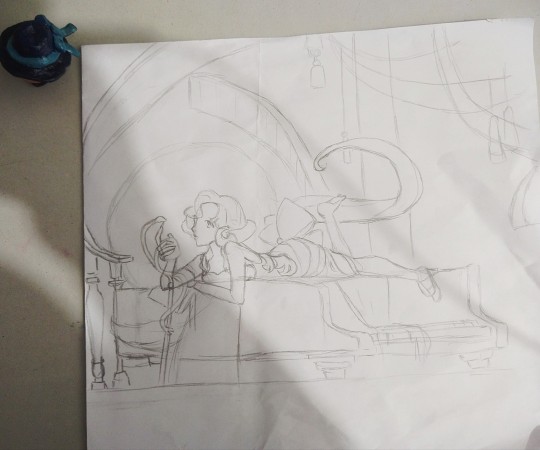
#anjo nala#r1999 fanart#r1999#damn i need to paint more#gouache#traditional art#art#bored#advice is appreciated#Tristes tropiques
19 notes
·
View notes
Text

#digital art#art#polterghost#procreate#beginner artist#artists on tumblr#drawing#fanart#magazine#anjo nala#bound with anjo nala#tristes tropiques#reverse 1999#r1999
11 notes
·
View notes
Text
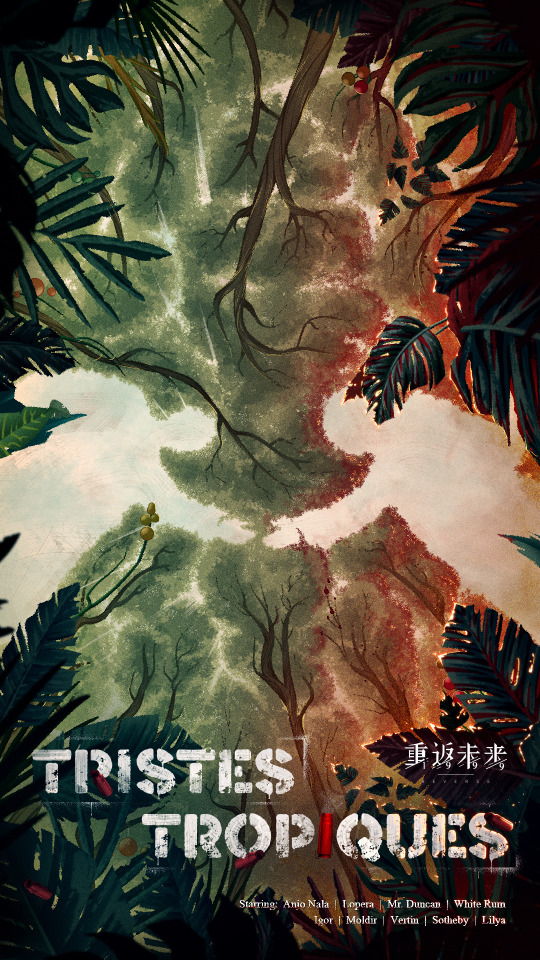
Reverse: 1999 2.2 poster “Tristes Tropiques”
Auto translated caption:
A collaboration across the ocean,
A gamble with an uncertain outcome.
When the sun shines down through the deep green canopy,
Did you know that——
Which beam of light is the "exit"?
The 2024 Box Tour Special Preview Program of "Meet in 1999" will be broadcast at 20:00 on September 6. The 2.2 version "Melancholy Tropics" PV and more exciting content will be broadcast for the first time in the program, so stay tuned.
13 notes
·
View notes
Text
It's a crime how this beautiful man doesn't get talked about on this site. And I mean when I search "admiral igor reverse 1999" it yields literally nothing lmao. So let's yap about him, shall we.

The plot twist was so unexpected. It's probably just me, but by unexpected I mean I didn't believe it until I saw the phrase "the end" on the screen lmao. That's either because (a) I was too distracted by my intense attraction for this goddamn 2D character to give the story my full focus, or (b) the game just didn't give enough of a background on him for me to be able to predict his actions. And you know what? I think the latter is valid for a number of reasons.
Apart from the controversy surrounding the setting's inspiration for the chapter, my only other gripe with it was that the story felt a little rushed. And for a character like Igor, who's now become a major player in the story, that's super unfair. He didn't have as much introduction as he deserved, because I tell you those trails in chapters 6 and 7 weren't enough to fully unpack that whopping baggage he had. I guess the fact that you didn't really know much about his past other than how he's lost and grieved a lot of people was good enough to steer you away from thinking about his motivations. But Enigma also experienced loss and grief, but he had a sister who fought for the same cause and his fury towards Manus is too great to make him defect. But maybe that's just me heartbroken from Igor's betrayal *sobs*
Even if chapter 8's major themes were betrayal and loyalty, the whole story just felt all over the place, because somehow they also wanted to inject how poverty and being on the margin of society ultimately affect those decisions, but it's just really sloppily done. Or the pacing was just too fast and there was just too much happening all at once. Also not a fan of how they used water to go to places, like, it makes sense but it felt too much like the head writer just moving the characters' literal pawn pieces from one spot to another. Sotheby being eaten by a big fish was funny but kinda random. The plot thread of Duncan being Mr. Karson just came and went. Igor's betrayal was a little unwarranted, I think a little foreshadowing would have made more impact. And Anjo being an exploited succubus is another plot thread that felt kind of detached from the story's overall theme of betrayal and loyalty.
This kind of veered into a little rant, but I'm just a little upset that my fave mysterious emotionally constipated guy had to be in probably the least liked main story chapter in the game. It sucks.
#admiral igor#reverse 1999#admiral igor reverse 1999#save this man from himself#chapter 8 spoilers#tristes tropiques
10 notes
·
View notes
Text

Did a lot of grinding trying to pass the final level of E Lucevan le Stelle this version, so I managed to buy out the whole store with tokens to spare haha
1 note
·
View note
Text

Record of Anjo Nala wiping savings clean before showing up
But at least she is here! P1 so far but hoping for a P2
37 notes
·
View notes
Text
No comboio de Amesterdão para cá, folheando o livro sobre os Tristes Tropiques, deparei com uma descrição dos Campos Elíseos, uma rua de São Paulo onde as casas de madeira pintadas de cores garridas, construídas pelos ricos numa espécie de estilo suíço de fantasia – assim Lévi-Strauss se lembra delas dos seus tempos de Brasil – vão caindo aos bocados nos jardins onde cresceram eucaliptos e mangueiras. Isso talvez explique por que razão naquela manhã o aeroporto, com o seu murmúrio abafado, me pareceu a antecâmara de um país desconhecido de onde nenhum viajante regressa.
W. G. Sebald - Os anéis de Saturno : uma romagem inglesa.
0 notes
Text

It's so nice getting to see more Vertin interactions with the team apart from scraps in voice lines and events. There's a reason she has so many arcanists of varying personalities following her command. It's why there was such a worry that the arcanists were loyal to her and not the Foundation itself. She's a great and charismatic leader, and most of all she cares.
#honeystar#yapping#reverse 1999#reverse: 1999#reverse 1999 2.2#tristes tropiques#vertin#vertin reverse 1999
30 notes
·
View notes